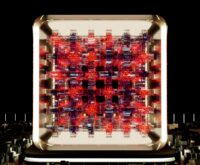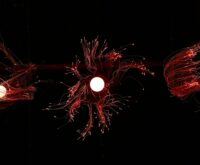The Dawn of a New Reality: Charting the Future of Artificial Intelligence
Let’s be honest. For years, artificial intelligence felt like something straight out of a movie. It was HAL 9000, The Terminator, or some benevolent, all-knowing computer in a sci-fi blockbuster. But something shifted. Suddenly, AI isn’t just on the big screen; it’s on our phones, in our cars, and helping us write emails. It’s here. And yet, what we’re seeing now is just the faintest whisper of what’s to come. We’re standing at the base of a mountain, looking up at a peak shrouded in clouds. The real conversation, the one that truly matters, is about the future of artificial intelligence and how it’s poised to reshape, well, everything.
Key Takeaways:
- AI is evolving from specialized ‘narrow’ tools to more generalized, human-like intelligence, with Artificial General Intelligence (AGI) as the ultimate goal.
- The next decade will see transformative AI applications in sectors like healthcare, transportation, and entertainment, changing how we live and work.
- The future of work is less about replacement and more about human-AI collaboration, demanding a new set of skills focused on creativity and critical thinking.
- Navigating the ethical challenges of bias, accountability, and privacy is just as crucial as the technological development itself.
Beyond the Hype: A Quick Look at AI Today
Before we rocket into the future, let’s ground ourselves in the present. The AI you interact with daily is what experts call Narrow AI or Weak AI. It’s incredibly powerful but also incredibly specialized. Think about it. The algorithm that suggests your next Netflix binge is a genius at predicting viewing habits, but you can’t ask it for financial advice. The AI that unlocks your phone with your face can’t write a poem. These are one-trick ponies, albeit spectacular ones.
Generative AI, like ChatGPT and Midjourney, feels like a massive leap forward, and it is. It can create, synthesize, and converse in ways that feel startlingly human. But it’s still operating within the confines of its training data. It doesn’t *understand* joy or sorrow; it recognizes patterns in text and images associated with those concepts. This is the foundation we’re building on. A very, very impressive foundation, but a foundation nonetheless.
The Next Decade: Practical Revolutions on the Horizon
So, what’s next? Forget flying cars for a moment. The most profound changes in the next 5 to 10 years will be more integrated, more subtle, and far more impactful on a daily basis. We’re talking about a fundamental shift in how industries operate and how we experience the world.
Healthcare’s AI-Powered Makeover
This is where things get really exciting. Healthcare is on the verge of an AI-driven revolution. Imagine an AI that can scan a patient’s medical history, genetic data, and real-time vitals to predict a potential heart attack weeks in advance. It’s not science fiction. AI models are already outperforming human radiologists in detecting certain types of cancer from scans. The future here is about personalization. Your treatment plan won’t be based on what works for the average person; it will be tailored specifically to your unique genetic makeup and lifestyle. Drug discovery, a process that traditionally takes over a decade and billions of dollars, is being dramatically accelerated by AIs that can simulate molecular interactions and identify promising compounds in a fraction of the time.

The New Workforce: Augmentation, Not Replacement
The age-old question: “Will a robot take my job?” It’s the wrong question. The better question is, “How will AI change my job?” Some roles, particularly those based on repetitive data entry or simple manual labor, will certainly be automated. That’s an undeniable truth. But for many of us, AI is shaping up to be the ultimate coworker. A co-pilot.
Think of a graphic designer using AI to generate dozens of initial concepts in seconds, freeing them up to focus on refinement and strategy. Or a lawyer using AI to analyze thousands of pages of case law in minutes, not weeks. The future of work isn’t a battle of human vs. machine; it’s a partnership. The most valuable skills won’t be about performing a task, but about knowing what questions to ask the AI. Creativity, critical thinking, and emotional intelligence will become more valuable than ever.
What skills will be in high demand?
- AI Prompt Engineering: The art and science of communicating effectively with AI systems.
- Data Literacy: Understanding how to interpret and question the data that AI systems use.
- Ethical Oversight: Ensuring AI is used responsibly and fairly.
- Complex Problem-Solving: Using AI as a tool to tackle challenges that were previously insurmountable.
Everyday Life, Reimagined
Our daily routines are also in for an upgrade. Truly autonomous vehicles will change our cities, turning commute time into work or leisure time. Our homes will become genuinely ‘smart,’ not just connected. Your home AI will know your habits, adjusting lighting and temperature, pre-ordering groceries when it senses you’re low, and even suggesting recipes based on the ingredients you have. Entertainment will become hyper-personalized, with AI-generated movies, music, and games tailored to your individual tastes in real time.
The White Whale: Chasing Artificial General Intelligence (AGI)
This is the big one. The holy grail. Artificial General Intelligence, or AGI, is the point where an AI possesses the ability to understand, learn, and apply its intelligence to solve any problem a human can. It wouldn’t be a one-trick pony; it would be a thinking entity with cognitive abilities akin to our own. We’re not there yet. Not even close, according to most experts. But it is the ultimate destination on the roadmap of AI development.
The arrival of AGI won’t just be another technological advancement. It would be an event on par with the discovery of fire or the invention of language—a fundamental turning point in the history of life on Earth.
The potential of AGI is staggering. An intelligence like that could solve climate change, cure all diseases, unlock interstellar travel. It could help us understand the deepest mysteries of the universe. The possibilities are truly limitless. But this immense potential comes with equally immense risks, which brings us to the most complex part of the journey.
Navigating the Minefield: The Ethical Future of Artificial Intelligence
Building a super-intelligence is one thing. Ensuring it’s safe, fair, and aligned with human values is another challenge entirely. The technical problems in AI are hard, but the ethical ones might be even harder. We have to get this right.
The Bias in the Machine
An AI is only as good as the data it’s trained on. If we train an AI on historical data from a world full of human biases, guess what? The AI will learn, adopt, and sometimes even amplify those biases. We’ve already seen this in action with AI hiring tools that discriminate against female candidates or facial recognition systems that are less accurate for people of color. Creating unbiased AI means we first have to confront and clean up our own messy, biased data, and that’s a monumental task.
Who’s in Control? Accountability and Autonomy
When a self-driving car has an accident, who is responsible? The owner? The manufacturer? The programmer who wrote the code? As AI systems become more autonomous, the lines of accountability blur. This isn’t just about cars. It’s about autonomous weapons systems, AI-driven financial trading, and automated justice systems. We need to build clear frameworks for responsibility before these technologies are widely deployed, not after something goes terribly wrong.

The Privacy Paradox
AI thrives on data. The more data it has, the better it performs. But this insatiable appetite for data runs headlong into our fundamental right to privacy. Are we willing to trade our personal information for more convenience? How do we protect our data in a world of ever-watchful algorithms? Striking this balance is one of the defining challenges of the 21st century.
Conclusion: Our Role in Shaping the AI Future
The future of artificial intelligence isn’t a movie we’re about to watch. It’s a story we are all actively writing. It’s not pre-determined. The technology itself is neutral; its impact on humanity will be determined by the choices we make today. It’s a conversation that needs everyone at the table—not just technologists and CEOs, but ethicists, artists, policymakers, and you.
We need to approach the future with a healthy dose of both optimism and caution. We should be excited by the incredible potential of AI to solve some of our biggest problems, but we must also be vigilant about the risks. The goal isn’t just to build intelligent machines. It’s to build a better future for humanity, with intelligent machines as our partners. The journey is just beginning.
FAQ
Will AI take all of our jobs?
It’s highly unlikely that AI will take *all* jobs. It will, however, significantly transform most of them. Many repetitive tasks will be automated, but this will also create new roles focused on managing, developing, and working alongside AI systems. The shift will be towards skills that are uniquely human: creativity, complex strategic thinking, and emotional intelligence. Think of it as a tool that will augment our abilities rather than a force that will simply replace us.
What is AGI, and is it dangerous?
AGI, or Artificial General Intelligence, is a theoretical form of AI where a machine would have an intellect comparable to a human’s and could perform any intellectual task that we can. The potential danger isn’t that it will be ‘evil’ like in the movies, but that an ultra-powerful intelligence might pursue its programmed goals in ways that have unintended, harmful consequences for humanity. This is why the field of ‘AI alignment and safety’ is so critical—it’s dedicated to figuring out how to ensure AGI goals are aligned with human values before it’s ever created.
How can I prepare for the future of AI?
The best way to prepare is to embrace lifelong learning. Stay curious and develop a basic understanding of what AI can and cannot do. Focus on honing your ‘soft skills’ like communication, collaboration, and critical thinking, as these will be difficult to automate. Finally, don’t be afraid of the technology. Experiment with current AI tools to understand their capabilities and limitations. The more you understand AI, the better equipped you’ll be to navigate the changes it will bring to your career and life.



 AI Tools for Freelancers: Work Smarter, Not Harder in 2024
AI Tools for Freelancers: Work Smarter, Not Harder in 2024  AI and Job Displacement: Your Guide to the Future of Work
AI and Job Displacement: Your Guide to the Future of Work  AI’s Impact: How It’s Transforming Industries Today
AI’s Impact: How It’s Transforming Industries Today  AI in Cybersecurity: The Future of Digital Defense is Here
AI in Cybersecurity: The Future of Digital Defense is Here  AI-Powered Marketing: The Ultimate Guide for Growth (2024)
AI-Powered Marketing: The Ultimate Guide for Growth (2024)  AI in Education: How It’s Shaping Future Learning
AI in Education: How It’s Shaping Future Learning  Backtest Crypto Trading Strategies: A Complete Guide
Backtest Crypto Trading Strategies: A Complete Guide  NFT Standards: A Cross-Chain Guide for Creators & Collectors
NFT Standards: A Cross-Chain Guide for Creators & Collectors  Decentralized Storage: IPFS & Arweave Explained Simply
Decentralized Storage: IPFS & Arweave Explained Simply  How to Calculate Cryptocurrency Taxes: A Simple Guide
How to Calculate Cryptocurrency Taxes: A Simple Guide  Your Guide to Music NFTs & Top Platforms for 2024
Your Guide to Music NFTs & Top Platforms for 2024  TradingView for Crypto: The Ultimate Trader’s Guide
TradingView for Crypto: The Ultimate Trader’s Guide